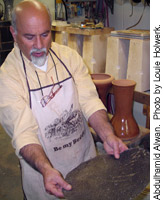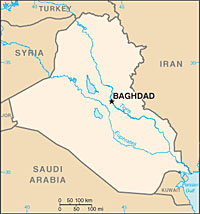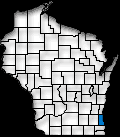Home | Search | The Artists | Teaching | Hiring | About This Site | Contact Us

Arabic Percussion
Milwaukee, WI
 Beat & Rhythm,
Beat & Rhythm,
Arab & Muslim
Have you ever thought two words meant the same thing, only to find out later that they don’t? For instance, many people use beat and rhythm to mean the same thing, but technically their meanings are different. Rhythm is what you hear, or what you dance to. Beats are the sounds that make up the rhythm.
Tap your hand once on the desk. That’s a beat. Now count “one, two, three and four,” and tap the desk when you say each word. That’s a rhythm.
Two other words that people sometimes think mean the same are Arab and Muslim. Like beat and rhythm, they actually mean different things. Arab refers to a cultural group, and
Muslim to a religious one. A Muslim is a person whose religion is Islam. An Arab is anyone from an Arabian
![]() country,
a country where Arabic is the main language. Not all Arabs are Muslim, and
not all Muslims are Arabic.
country,
a country where Arabic is the main language. Not all Arabs are Muslim, and
not all Muslims are Arabic.
It Was Already Perfect
Abdulhamid Alwan is an
Arabesque artist living in Milwaukee. He was born in Baghdad,
Iraq in 1938,
![]() and came to the United States to study engineering when he was a teenager. He became interested in
Arabic
percussion and began to make traditional Arabic drums called
tabla or
doumbek.
and came to the United States to study engineering when he was a teenager. He became interested in
Arabic
percussion and began to make traditional Arabic drums called
tabla or
doumbek.
Today, Hamid makes many types of drums, but the tabla is still the one he makes most often. Tablas are the most popular drum used in Arabic music.
When Hamid began making tablas, he experimented with different drum shapes.
“I wanted to reinvent the Arabian tabla,” he says.
But the more tablas he made, the closer he came to the traditional design. The tablas he makes today are similar in shape and size to tablas he saw growing up in Iraq.
Hamid doesn’t just make the drums. He plays them and teaches others how to play. He is considered a master traditional Arabic percussionist, one of the most knowledgeable Arabic percussionists in the world. He knows over one-hundred traditional Arabic rhythms.
Hamid and his wife Kim own a store in Milwaukee. That’s also where Hamid makes his drums. Let’s go visit the store and see Hamid make a tabla!
For Educators:
![]()
Send us
your class presentations for our Showcase!
Home | Search | The Artists | Teaching | Hiring | About This Site | Contact Us

